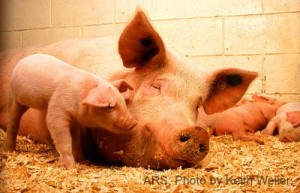The Humane Society of the United States (HSUS) filed a legal complaint with the Federal Trade Commission last week, alleging that the National Pork Producers Council’s (NPPC) ads are deceptive. The ads in question are titled: “We Care Initiative” and “Pork Quality Assurance Plus” programs.
 The issue centers around breeding sows raised in gestation crates. About 70% of these animals are confined in the crates, which are so small the animals cannot move freely. The trade group claims in its ads that the animals “receive humane care and handling.”
The issue centers around breeding sows raised in gestation crates. About 70% of these animals are confined in the crates, which are so small the animals cannot move freely. The trade group claims in its ads that the animals “receive humane care and handling.”
The NPPC stated that they will “analyze the complaint” and “vigorously defend against the absolutely false claims made by HSUS.”
An American Farm Bureau poll conducted in 2007 found that 95% of Americans think farm animals should be well cared for, and 89% agree with the statement that “food companies that require farers to treat their animals better are doing the right thing.”
Food Poisoning Bulletin asked the Humane Society about this conflict, and if gestation crates raise the risk of bacterial contamination in the animals.
Dr. Michael Gregor, Director of Public Health and Animal Agriculture for HSUS, said, “As reviewed in our white paper, crated sows suffer elevated rates of a variety of health problems, including urinary trace infections (a leading cause of sow mortality), and respiratory disease. Preliminary research out of Iowa State University suggests respiratory diseases may have food safety implications.”
The white paper mentions that the Pew Commission on Industrial Farm Animal Production concluded that the use of gestation crates should be ended, since they “prevent the animal from a normal range of movement and constitute inhumane treatment.”
The study from Iowa State University measured relationships between lesions on the pig carcasses and the risk of human foodborne illness. The study states that there is a correlation between food animal’s health and human health risk. They quantified that risk by measuring bacteria counts in the animal carcasses: for instance, Campylobacter counts increased by more than 5% for each “peel-out”, which are adhesions inside the animal that are “peeled out” during slaughter.
Several companies that raise pigs said they are going to end the use of gestation crates at the end of 2017. We asked Paul Shapiro, Vice President of Farm Animal Protection for HSUS about this issue. He said, “five years is a long time, but these kinds of changes can’t happen overnight due to the significant financial investments needed to make this transition. We always want progress faster, but we’re glad to see the major pork buyers demanding these changes.”
HSUS is trying to get more states to pass laws to ban the use of gestation crates. Three companies that are phasing out gestation crates are Smithfield Foods, Cargill, and Hormel Foods. McDonald’s, Wendy’s, and Compass Group are eliminating gestation crates from their supply chains, according to HSUS.
Finally, we wanted to know how consumers can identify pork products from animals that are humanely raised. The Humane Society offers guide books on welfare labels that are used in the meat industry. Consumers can read those books so they know what they are buying at the grocery store.




